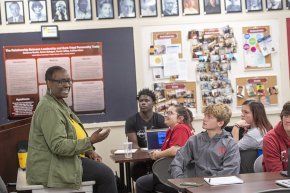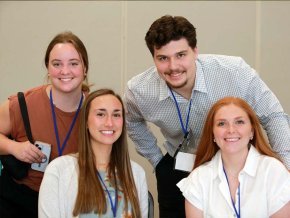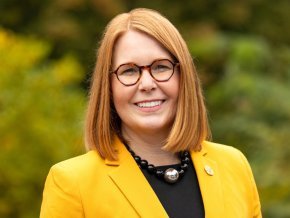
Purpose, preparation, vocation
New general education curriculum has been revised with students’ focus in mind
Undergraduates arriving at Lenoir-Rhyne for the fall 2023 semester will encounter a new general education curriculum aimed at increasing student choice and flexibility outside of their majors.

“Periodic revisions to general education requirements are routine for most institutions, including LR. The goal is to keep these requirements up to date and in line with the best practices to prepare students for the workforce and for graduate and professional school,” said Jennifer Burris, Ph.D., university provost and vice president of academic affairs.
The general education curriculum is the series of courses all students must take to earn their undergraduate degree, regardless of major. These courses provide graduates with a liberal arts foundation of interdisciplinary knowledge alongside a grounding in core values such as curiosity, critical thought, community, leadership and service.
“Coursework in the major is focused to prepare students for the next step along a career path. At Lenoir-Rhyne, general education coursework in the liberal arts provides a means for students to explore and pursue their vocation — their talents, gifts and passions that they can use to make the world a better place,” Burris explained.
The revised general education curriculum requires study in communications, mathematics, global language and culture, religion, fine arts, humanities, social sciences and natural sciences, plus a capstone and a professional skills course for senior-level students. However, it is sized to allow students the flexibility outside of general education and their major for additional credits to pursue a double major, a minor or concentration, study abroad, or simply explore other interests.
With a number of required general education credit hours comparable to other institutions, the new curriculum creates a smoother transition for transfer students who are entering from other four-year institutions or from community colleges through the Bear Bound agreement, allowing them to move into their major requirements quickly.
First-year students will fulfill their general education requirements under the new curriculum, but continuing students will have a choice to continue under the previous guidelines or move to the new ones.
“Students who have the option to choose should talk to their advisors about which curriculum is more advantageous for them,” said Janet Painter ’85, Ph.D., director of institutional assessment and director of general education. “Once that choice is made, it is permanent, so we want to give upper-class students every opportunity to pick what’s best for their goals.”
Painter added that the flexibility of the new guidelines would also facilitate academic innovation by providing opportunities for faculty members to propose and implement new courses bringing together their own academic interests with student needs.
“I experienced the general education curriculum as a student at LR during an early shift toward a more value-oriented and interdisciplinary focus,” she said. “Many of those courses were far more than just items on a checklist. I got a real feel for what those classes would mean for me later, and with the passage of time, they became even more relevant to me. The goal is to give everyone that kind of transformative experience.”

Lenoir-Rhyne University students showcased their academic excellence and research expertise at the 2025 North Carolina Academy of Science (NCAS) annual meeting in late March.
View More
Lenoir-Rhyne University has selected Summer McGee, Ph.D, as the institution’s 13th president. Her appointment was enthusiastically approved by the Lenoir-Rhyne Board of Trustees after a national search.
View More